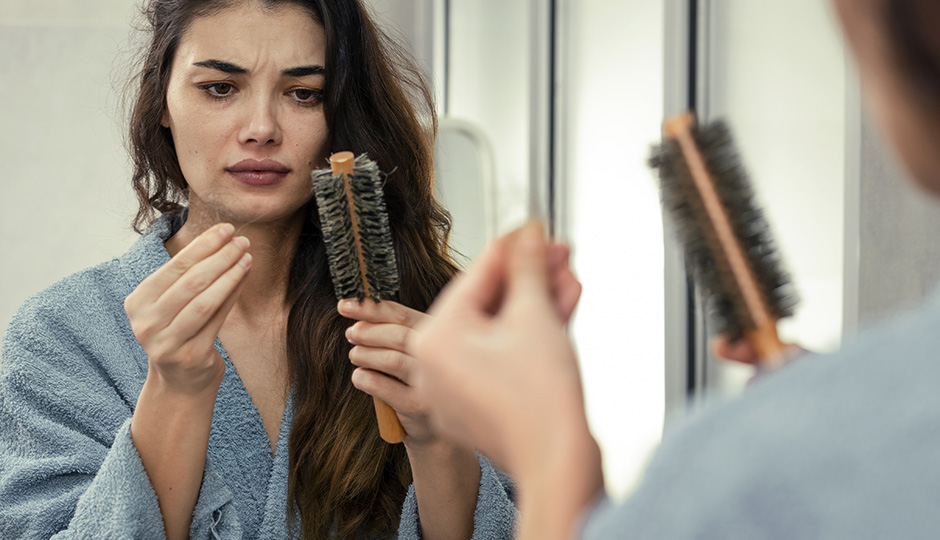We live in a world where talking about women’s hair loss is still taboo. For guys, it’s just a consequence of aging that everyone accepts. It’s not like male pattern baldness is a secret. Unfortunately, society tends to look at women with hair loss as either being sick or having bad hygiene. People stare at your head or divert their eyes. Strangers act differently.
If this is what you’re experiencing then it's time to come see us! But here’s the real secret. For most women, hair loss is not extreme nor sudden. And that’s why so many women don’t notice at first that their hair is thinning. It happens gradually. Whereas men tend to develop bald spots, women's hair starts thinning, and has to progress pretty far, usually at least 50%, before you or someone else can notice it with the naked eye. Often this is because less hairs are coming out of the hair follicle. When younger you may have 3, 4, or 5 hairs coming from each follicle. With the normal aging process, or due to a medical or hormonal causes, the number of follicles reduce, causing the thinning appearance.



Get Answers
If you know your hair is thinning or are just starting to wonder if it might be, the first thing you need is some answers. Start by verifying that it's not just your color or haircut or overanalyzing the hair left behind on your pillow or brush. When you visit Custom Design Hair, your initial consultation is free, and we can help you analyze your current situation.
Involve Your Doctor
You should consult your doctor regarding any hair loss concerns to rule out any underlying medical conditions. But don’t be afraid if your hairdresser, aesthetician, or Primary Care Physician can’t offer you solutions. Hair loss is a specialized field, with its own realm of scientific study (called Trichology). Other professionals – even medical doctors – don’t usually have the expertise to give you specific answers about hair loss. That’s why it’s so important to find a hair loss specialist you trust as soon as you realize you have a hair loss problem.
When you know why you’re losing hair, you get a direct path to your “how” – how to fix it, how to feel better, and how to plan for the future.
Medical Hair Loss
Hair loss can be a frustrating side effect of medical treatments. The causes are diverse, ranging from bald spots related to scars, burns, or surgery to the full-head hair loss expected with chemotherapy. Some medications will cause temporary hair loss, while others may have a permanent impact. With chemotherapy hair loss can be anticipated and plans can be put in place to smooth the process. Losing your hair is always emotional, but having a clear plan beforehand can reduce your anxiety and the impact on your self-image.
Health-Related Hair Loss
The diverse causes of women’s hair loss make it important to get to the bottom of your hair loss as early as possible. Lupus, diabetes, thyroid disorders, and skin conditions are among the causes of hair loss that require treatment for underlying issues. Any event or condition that significantly stresses your system can lead to some degree of hair loss. Hormone changes like those related to pregnancy, significant weight loss and menopause can also make hair start thinning, as can vitamin deficiencies, traumatic events, or even stress.
Female Pattern Baldness
More than 30 million American women suffer from some level of hair loss. Male pattern baldness is common knowledge, yet it’s amazing how little we hear about women’s heredity hair loss. Female pattern baldness is caused by the same Androgenetic alopecia that causes hair to thin when naturally occurring testosterone (women have it too) reacts with a natural enzyme to create a hormone called dihydrotestosterone, or DHT. DHT clogs hair follicles, blocks nutrients from reaching hair, and kicks off the process that leads to hair loss.
Other Forms of Alopecia
In addition to androgenetic alopecia, several other forms of alopecia can cause hair loss for women. All types of alopecia are autoimmune disorders, which means that the immune system mistakenly attacks healthy (in this case, hair) cells. Alopecia areata can come and go, and it causes uneven hair loss, usually in patches. In Alopecia totalis, a woman loses all hair from her scalp. Alopecia Universalis is a widespread condition that can cause complete and permanent hair loss over the scalp and entire body.
Find the Right Solution for Your Hair Loss
Whether you know the cause of your hair loss or not, the Custom Design Hair Loss team are loss professionals can help you take the next step with their women's hair loss solutions. Hair loss is scary, but you’ll feel so much better once you have someone on your side. Schedule your FREE confidential consultation now!



